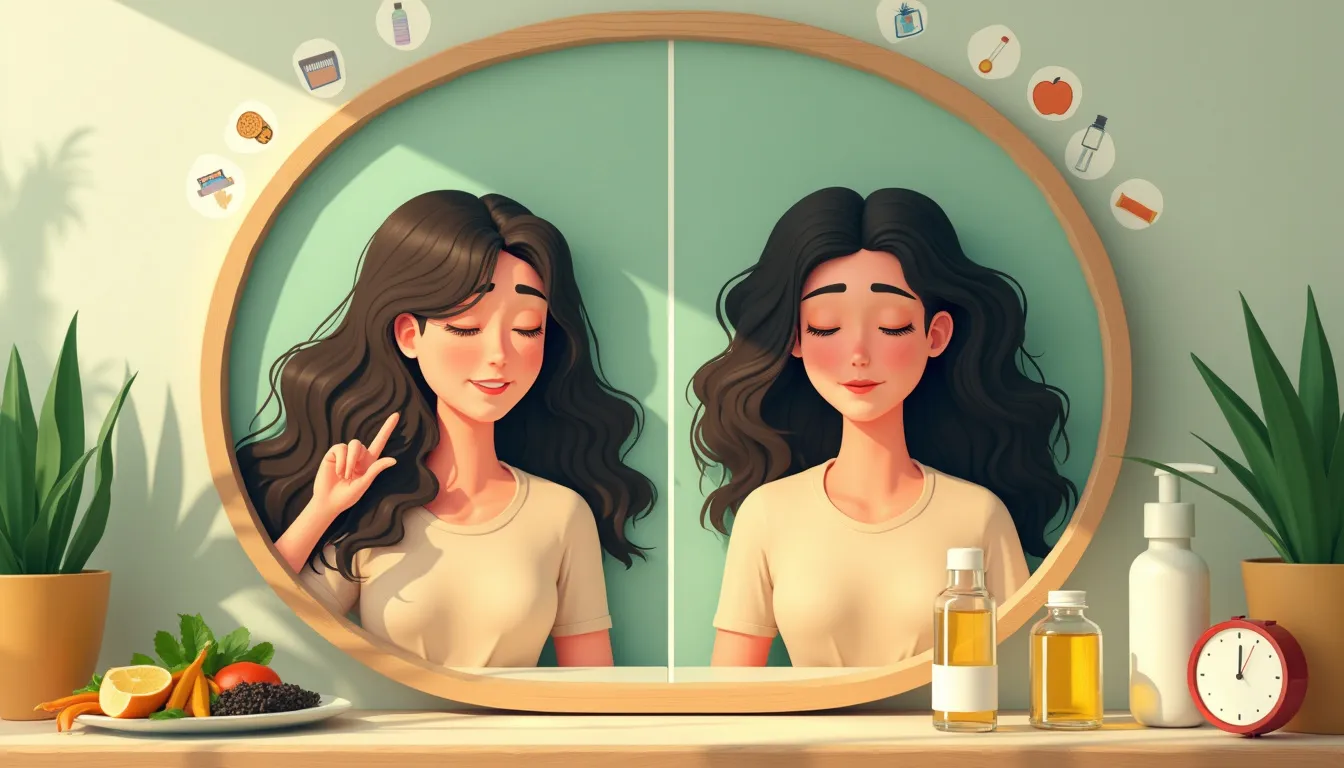Are you tired of seeing more hair in your brush than on your head? You’re not alone. Hair fall is a common concern that affects millions of people worldwide, regardless of age or gender. Whether you’re noticing a gradual thinning or sudden clumps of hair in the shower drain, it’s time to take action. In this comprehensive guide, we’ll explore 5 Effective Strategies for Hair Fall Control You Can Start Today. From understanding the root causes of hair loss to implementing practical solutions, we’ve got you covered. Don’t let hair fall dampen your confidence or self-esteem any longer. With the right approach and early intervention, you can regain control over your hair health and rediscover your crowning glory. So, let’s dive into the world of hair fall control and uncover the secrets to maintaining a luscious, vibrant mane that turns heads for all the right reasons. Get ready to say goodbye to excessive shedding and hello to healthier, fuller-looking hair!
Understanding Hair Fall: Causes and Importance of Control
Hair fall, also known as hair loss or alopecia, is a common concern that affects millions of people worldwide. While it’s normal to lose between 50 to 100 hairs a day, excessive hair shedding can be distressing and may indicate underlying health issues. In this section, we’ll explore the common reasons for hair loss, its impact on self-esteem, and the benefits of early intervention in hair fall control.
Common Reasons for Hair Loss
Hair fall can be attributed to various factors, ranging from genetics to lifestyle choices. Understanding these causes is crucial for effective hair fall control. Here are some of the most common reasons:
- Genetics: Hereditary hair loss, known as androgenetic alopecia or pattern baldness, is the most common cause of hair fall. It affects both men and women and is influenced by genes and hormones.
- Hormonal Changes: Fluctuations in hormones due to pregnancy, childbirth, menopause, or thyroid problems can lead to temporary or permanent hair loss.
- Nutritional Deficiencies: Lack of essential nutrients like iron, protein, and vitamins (particularly B-vitamins and vitamin D) can contribute to hair fall.
- Stress: Physical or emotional stress can trigger a type of hair loss called telogen effluvium, where hair prematurely enters the resting phase and falls out.
- Medical Conditions: Certain autoimmune diseases, such as alopecia areata, can cause patchy hair loss. Scalp infections like ringworm can also lead to hair fall.
- Medications: Some drugs used to treat cancer, arthritis, depression, heart problems, and high blood pressure may cause hair loss as a side effect.
- Hairstyling Practices: Excessive use of heat styling tools, tight hairstyles, and harsh chemical treatments can damage hair and lead to breakage and loss.
Identifying the root cause of hair fall is essential for implementing effective hair fall control strategies. If you’re experiencing significant hair loss, it’s advisable to consult a dermatologist or trichologist for a proper diagnosis.
Impact of Hair Fall on Self-Esteem and Confidence
Hair is often considered a defining feature of one’s appearance, and hair loss can have a profound psychological impact. The effects of hair fall on self-esteem and confidence include:
- Decreased Self-Image: Many people associate their hair with youth and attractiveness. Hair loss can lead to feelings of unattractiveness and premature aging.
- Social Anxiety: Individuals experiencing hair fall may become self-conscious in social situations, leading to withdrawal and isolation.
- Depression: Persistent hair loss can contribute to feelings of helplessness and depression, especially if it affects daily life and relationships.
- Reduced Quality of Life: Hair fall can impact various aspects of life, including career prospects and personal relationships, due to lowered self-confidence.
- Body Dysmorphia: In severe cases, hair loss can lead to an unhealthy preoccupation with perceived flaws in appearance.
Given these psychological impacts, it’s crucial to address hair fall not just as a cosmetic issue but as a matter of overall well-being. Effective hair fall control measures can significantly improve one’s quality of life and mental health.
Benefits of Early Intervention in Hair Fall Control
Taking action at the first signs of hair fall can lead to better outcomes and prevent further loss. Here are some key benefits of early intervention:
- Preservation of Existing Hair: Early treatment can help maintain the hair you still have, preventing further thinning or baldness.
- Increased Treatment Efficacy: Many hair fall control treatments work best when started early, before significant loss occurs.
- Prevention of Permanent Loss: Some types of hair loss, if caught early, can be reversed or halted before they become permanent.
- Cost-Effectiveness: Addressing hair fall early often requires less intensive (and less expensive) treatments compared to advanced hair loss.
- Emotional Well-being: Taking proactive steps towards hair fall control can provide a sense of empowerment and reduce anxiety associated with hair loss.
- Identification of Underlying Issues: Early intervention can lead to the discovery and treatment of underlying health conditions causing hair fall.
One effective early intervention program for hair fall control is Fortify, which offers a comprehensive approach to maintaining healthy hair and preventing further loss.
Understanding the causes and importance of hair fall control is the first step towards addressing this common concern. By recognizing the signs early and taking appropriate action, you can protect your hair, boost your confidence, and potentially uncover and treat any underlying health issues. Remember, while hair fall can be distressing, there are numerous effective strategies and treatments available to help you regain control of your hair health.

Natural Remedies and Lifestyle Changes for Hair Fall Control
When it comes to hair fall control, nature often provides some of the most effective solutions. By making simple changes to your daily routine and incorporating natural remedies, you can significantly reduce hair fall and promote healthier hair growth. Let’s explore some of these methods that you can easily implement in your life.
Nutritional Adjustments for Healthier Hair
Your diet plays a crucial role in maintaining healthy hair. A balanced diet rich in certain nutrients can work wonders for hair fall control. Here are some key nutritional adjustments you can make:
- Protein-rich foods: Hair is primarily made of protein, so including lean meats, fish, eggs, and plant-based proteins like lentils and beans in your diet is essential.
- Iron-rich foods: Iron deficiency can lead to hair loss. Incorporate spinach, kale, and other leafy greens into your meals.
- Omega-3 fatty acids: These healthy fats nourish hair follicles. Salmon, walnuts, and flaxseeds are excellent sources.
- Vitamin C: This vitamin aids in collagen production and iron absorption. Citrus fruits, berries, and bell peppers are rich in Vitamin C.
- Biotin: Also known as Vitamin B7, biotin is crucial for hair health. You can find it in eggs, nuts, and whole grains.
Remember, staying hydrated is equally important. Drinking adequate water helps in nutrient circulation, which is vital for hair health.
Scalp Massage and Oil Treatments
Regular scalp massages can significantly contribute to hair fall control by improving blood circulation to the hair follicles. This increased blood flow nourishes the hair roots, promoting stronger and healthier hair growth. Here’s how you can incorporate this into your routine:
- Use your fingertips to gently massage your scalp in circular motions for 5-10 minutes daily.
- For added benefits, use natural oils like coconut, almond, or jojoba oil during your massage.
- Leave the oil on for at least an hour or overnight before washing it off with a mild shampoo.
Oil treatments not only nourish your hair but also help in reducing protein loss from hair. Some popular oil treatments for hair fall control include:
- Coconut oil: Known for its deep penetrating properties, it helps reduce protein loss in hair.
- Castor oil: Rich in ricinoleic acid, it’s believed to promote hair growth and reduce hair fall.
- Argan oil: Packed with antioxidants, it helps in nourishing and strengthening hair.
For an extra boost, you can add a few drops of rosemary or peppermint essential oil to your base oil. These essential oils are known to stimulate hair growth.
Stress Management Techniques
Stress is a significant contributor to hair fall. When you’re stressed, your body produces cortisol, which can push hair follicles into a resting phase, leading to increased hair fall. Therefore, effective stress management is crucial for hair fall control. Here are some techniques you can try:
- Meditation: Regular meditation can significantly reduce stress levels. Start with just 5-10 minutes a day and gradually increase the duration.
- Yoga: Certain yoga poses, like downward dog and child’s pose, increase blood flow to the scalp, promoting hair health while reducing stress.
- Deep breathing exercises: Practice deep breathing for a few minutes daily. It can instantly calm your mind and reduce stress.
- Regular exercise: Physical activity releases endorphins, which are natural stress busters. Aim for at least 30 minutes of moderate exercise daily.
- Adequate sleep: Lack of sleep can increase stress levels. Ensure you get 7-9 hours of quality sleep each night.
Remember, consistency is key when it comes to stress management. Make these practices a part of your daily routine for the best results in hair fall control.
While these natural remedies and lifestyle changes can be highly effective for hair fall control, it’s important to remember that severe or persistent hair loss might require professional intervention. If you’re experiencing excessive hair fall despite these measures, it’s advisable to consult a dermatologist or trichologist.
For those looking for additional support in their hair fall control journey, consider exploring hair growth programs that offer comprehensive solutions. These programs often combine natural remedies with scientifically-backed treatments for optimal results.
By incorporating these natural remedies and lifestyle changes into your daily routine, you’re not just working towards hair fall control, but also promoting overall health and well-being. Remember, healthy hair is a reflection of a healthy body and mind. Stay consistent, be patient, and you’ll soon see the results of your efforts in stronger, healthier hair.

III. Professional Treatments and Products for Effective Hair Fall Control
While natural remedies and lifestyle changes can be beneficial for hair fall control, sometimes professional treatments and products are necessary to combat more severe cases of hair loss. Let’s explore some of the most effective options available:
A. Medicated Shampoos and Topical Solutions
One of the first lines of defense in professional hair fall control is the use of medicated shampoos and topical solutions. These products are specifically formulated to target the root causes of hair loss and promote healthier hair growth.
- Ketoconazole shampoos: Originally developed as an antifungal treatment, ketoconazole has shown promise in reducing hair loss. It works by decreasing inflammation of the hair follicles, which can contribute to hair fall.
- Minoxidil: This FDA-approved topical solution is one of the most popular and effective treatments for hair loss. Available over-the-counter, minoxidil works by increasing blood flow to the hair follicles and prolonging the growth phase of the hair cycle.
- Prescription shampoos: In some cases, dermatologists may prescribe specialized shampoos containing ingredients like corticosteroids or zinc pyrithione to address specific scalp conditions contributing to hair fall.
When using these products, it’s crucial to follow the instructions carefully and be patient, as results may take several months to become noticeable. Consistency is key in hair fall control treatments.
B. Hair Growth Supplements and Vitamins
Nutritional deficiencies can play a significant role in hair loss. While a balanced diet is essential, sometimes our bodies need an extra boost. Hair growth supplements and vitamins can help fill these nutritional gaps and support healthy hair growth.
- Biotin: Also known as Vitamin B7, biotin is crucial for the production of keratin, the protein that makes up hair. Studies have shown that biotin supplementation can improve hair growth in people with deficiencies.
- Iron: Iron deficiency is a common cause of hair loss, especially in women. If blood tests reveal low iron levels, supplementation under medical supervision can help combat hair fall.
- Vitamin D: Research has linked vitamin D deficiency to hair loss. Supplementation may help stimulate new and old hair follicles, promoting thicker hair growth.
- Omega-3 fatty acids: These essential fats nourish hair follicles and support scalp health. Fish oil supplements are a popular source of omega-3s.
It’s important to note that while these supplements can be beneficial, they should be taken under the guidance of a healthcare professional. Excessive intake of certain vitamins and minerals can have adverse effects.
C. Advanced Therapies: PRP and Hair Transplantation
For those experiencing more severe hair loss or those who haven’t seen results with other methods, advanced therapies offer hope for effective hair fall control.
Platelet-Rich Plasma (PRP) Therapy
PRP therapy is an innovative treatment that uses your own blood to stimulate hair growth. Here’s how it works:
- A small amount of blood is drawn from the patient.
- The blood is processed to concentrate the platelets, which are rich in growth factors.
- This platelet-rich plasma is then injected into the scalp.
- The growth factors stimulate dormant hair follicles, promoting new growth and strengthening existing hair.
PRP therapy has shown promising results in many patients, with minimal side effects since it uses the patient’s own blood. However, multiple sessions are usually required for optimal results.
Hair Transplantation
For those with significant hair loss, hair transplantation can be a life-changing solution. This surgical procedure involves moving hair follicles from areas of the scalp with thicker growth (typically the back of the head) to areas experiencing thinning or baldness.
There are two main types of hair transplantation:
- Follicular Unit Transplantation (FUT): A strip of skin with hair follicles is removed from the donor area and individual follicles are transplanted to the recipient area.
- Follicular Unit Extraction (FUE): Individual hair follicles are extracted directly from the donor area and transplanted to the recipient area.
While hair transplantation can provide dramatic results, it’s important to have realistic expectations. The procedure is best suited for those with stable hair loss patterns and sufficient donor hair.
Remember, the key to successful hair fall control is early intervention. If you’re noticing increased hair shedding or thinning, don’t wait to seek help. A dermatologist or trichologist can assess your individual case and recommend the most appropriate treatment plan.
For those looking for a comprehensive approach to hair fall control, consider checking out the Fortify program. This innovative program combines multiple strategies to help stop hair loss and promote healthier, stronger hair growth.
By combining professional treatments with a healthy lifestyle and proper hair care routine, you can take control of your hair health and regain your confidence. Remember, hair fall control is a journey, not a destination. Stay patient, consistent, and positive throughout your hair restoration process.
In conclusion, taking control of hair fall is not only possible but also essential for maintaining healthy, vibrant locks and boosting self-confidence. The five strategies outlined in this article provide a comprehensive approach to combat hair loss, addressing both internal and external factors that contribute to this common concern.
By understanding the root causes of hair fall and implementing a combination of natural remedies, lifestyle changes, and professional treatments, you can significantly improve the health and appearance of your hair. Remember, consistency is key when it comes to hair fall control. It’s important to be patient and persistent with your chosen methods, as visible results may take time to manifest.
While some strategies, like dietary changes and scalp massages, can be easily incorporated into your daily routine, others may require professional guidance. Don’t hesitate to consult with a trichologist or dermatologist if you’re experiencing severe or persistent hair loss. They can provide personalized advice and recommend advanced treatments tailored to your specific needs.
Ultimately, the journey to hair fall control is a personal one, and what works best may vary from person to person. Be open to experimenting with different approaches and listen to your body’s response. With dedication and the right combination of strategies, you can achieve healthier, fuller hair and regain your confidence.
As you embark on your hair fall control journey, consider exploring additional resources and support. For a comprehensive program designed to help stop hair loss and promote hair growth, check out the Fortify program at hairsecurity.net/fortify. This evidence-based approach could be the key to unlocking your hair’s full potential and putting an end to excessive hair fall.
Remember, your hair is a reflection of your overall health and well-being. By prioritizing hair fall control, you’re not just investing in your appearance, but also in your long-term health and self-esteem. Start implementing these strategies today, and take the first step towards healthier, more resilient hair.
